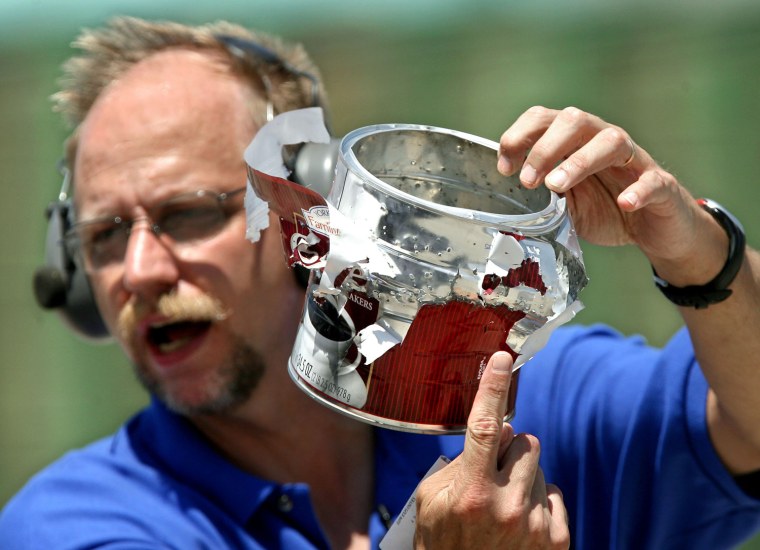A former FBI bomb technician has offered to plead guilty to leaking classified information about a foiled Yemen bomb plot against a U.S.-bound commercial jetliner to the Associated Press.
Donald J. Sachtleben, a 25-year veteran of the FBI who retired in 2008 but continued working as a contractor, has filed a petition to plead guilty to violating national security laws, according to court documents filed Monday. Sachtleben, of Carmel, Ind., also will plead guilty to child pornography distribution charges resulting from an unrelated investigation, the documents said.
"I am deeply sorry for my actions,” Sachtleben said in a statement issued by his attorneys, Larry Mackey and Kathleen Sweeney. ‘While I never intended harm to the United States or to any individuals, I do not make excuses for myself. I understand and accept that today’s filings start the process of paying the full consequences of my misconduct, and I know that the justice system I once served so proudly will have its say."
U.S. officials have said the leak, which led to a May 2012 AP article disclosing what it said was a CIA operation that foiled the bomb plot, was especially harmful because it placed an undercover operative working for British intelligence in danger.
The leak led the Justice Department to obtain a secret subpoena for about two months of AP phone records on 20 separate telephone lines in an effort to identify the leaker.
The department said Monday that the rare targeting of journalists enabled investigators to break the case.
“Sachtleben was identified as a suspect in the case of this unauthorized disclosure only after toll records for phone numbers related to the reporter were obtained through a subpoena and compared to other evidence collected during the leak investigation,” it said in the press release. “This allowed investigators to obtain a search warrant authorizing a more exhaustive search of Sachtleben’s cell phone, computer, and other electronic media, which were in the possession of federal investigators due to the child pornography investigation.”
Paul Colford, a spokesman for the AP, indicated that the news service continues to view the secret seizure of its phone records as an unnecessary overreach by the DOJ.
“The AP has already denounced at the time it was revealed that our records were subpoenaed by the Department of Justice,” he said. “We never ever comment about sources in any way on any story.”
The AP article on May 7, 2012 resulting from the leak disclosed what it said was a CIA operation that foiled a plot to plant a bomb on a U.S.-bound plane from Yemen on the first anniversary of Osama bin Laden's death.
The covert operation involved an informant working for British intelligence, who passed along information about a plot to detonate a refined version of a so-called “underwear bomb” aboard a U.S.-bound aircraft, intelligence officials told NBC News. The leak, and the CIA’s subsequent claim that it was behind the operation, infuriated the British, who said it put their operative at risk, according to the officials, who spoke on condition of anonymity.
According to a charging document filed Monday, “Sachtleben knowingly and willfully disclosed national defense information to a reporter for a national news organization not entitled to receive it,” on May 2, 2012 – five days before the AP article appeared. It also alleges that Sachtleben had reason to believe the information could be used to harm the United States. He also faces charges of willfully retaining documents relating to the national defense without authorization in connection with the leak.
In an apparent coincidence, federal investigators arrested Sachtleben nine days after he leaked the information in connection with a child pornography investigation dating to September 2010. The court documents said investigators targeted Sachtleben after arresting an Illinois resident with whom he allegedly traded child porn images online.
The criminal complaint in that case alleges that an initial forensic examination of Sachtleben’s laptop computer revealed the presence of approximately 30 images and video files containing child pornography. It is alleged that a number of files identified during this initial search matched those that had been found in the course of investigating the Illinois defendant. The complaint further alleges that the laptop’s hard drive contained references to other files known to have been in the possession of the Illinois defendant.
NBC News National Investigative Correspondent Michael Isikoff and Investigations Editor Mike Brunker also contributed to this report.
More from NBC News Investigations:
